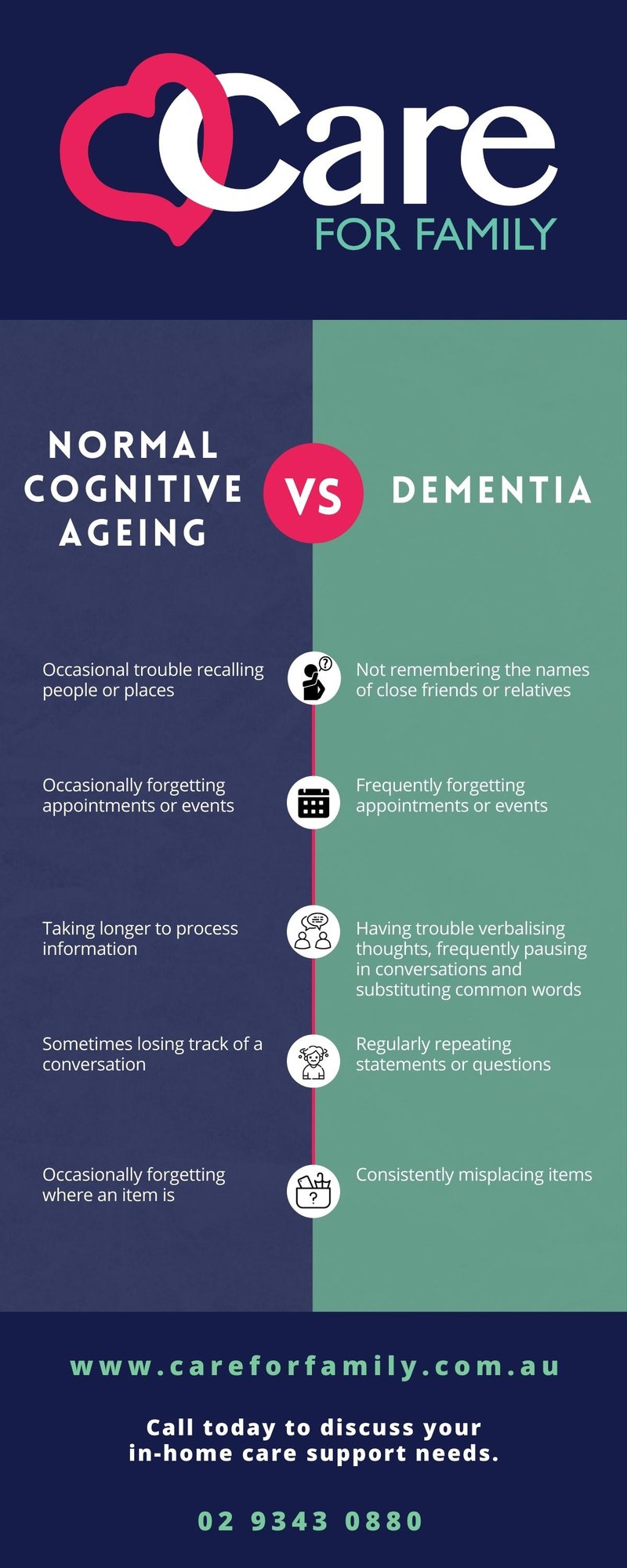The Signs Of Normal Cognitive Ageing Vs Dementia

Tags:
dementiaMay 4, 2022
Certain changes to both our minds and bodies are a normal part of ageing - from slower reflexes to aching joints, to reduced mobility, and even some memory loss. In many ways, normal ageing can look a lot like the early stages of dementia. However, distinguishing the signs and symptoms of dementia from those of ageing is crucial for health, longevity, and planning for the future. If you are wondering whether your loved one is showing signs of dementia or simply normal signs of ageing, this article will shed some light.
VIEW OUR NORMAL COGNITIVE AGEING VS DEMENTIA INFOGRAPHIC
Normal cognitive ageing vs dementia
Is it dementia, or just old age? The difference is hard to tell and can cause a lot of distress for the family members of ageing loved ones. Having the conversation can be a tough one, so being able to spot the normal signs of ageing as opposed to the common symptoms of dementia is important. Here are some of the basics, when it comes to the normal signs of ageing:
- Some memory loss, including trouble remembering specific details or conversations – especially if they happened a long time ago
- Forgetting things, such as words, or appointments, but remembering them when mentioned
- Slower reaction and reflex times
- Slightly reduced (and gradual worsening of) mobility
- Aches and pains in the joints
- Vision impairment related to ageing, such as cataracts
- Aversion to changes in routine
The symptoms of dementia, especially in the early stages of Alzheimer’s disease or other common types of dementia such as vascular dementia or frontotemporal dementia, can be hard to distinguish from those of normal cognitive decline – as mild cognitive decline is part and parcel of getting older. For example, age-related memory impairment versus dementia can be particularly challenging to spot. Importantly, even though a normal part of ageing, some of these things may be a risk factor for developing dementia down the track, and should be monitored as your loved one grows older.

As with any medical condition, a dementia diagnosis should be done by a qualified medical practitioner. But knowing some of the more serious symptoms to look out for can mean spotting the signs of dementia earlier. Here are some common signs of dementia to keep an eye out for:
- Significant problems with language, such as recalling very common words, that can lead to difficulty having a conversation
- Forgetting more recent events, forgetting faces, or having trouble understanding what’s happening as it’s happening
- Trouble with retaining or developing new skills and knowledge
- Noticeable and significant changes in mood or personality, especially if sudden
- Enhanced irritability, or signs of depression or anxiety that are new
- Signs of being withdrawn, apathetic, or no longer enjoying things the things they once loved
- Trouble with losing items, getting lost, or difficulty with directions to and from familiar places
- More significant slowing of reaction times and reflexes which make things like driving, cooking, or other everyday tasks unsafe
- Greater trouble with vision (including tunnel vision), balance, and coordination, that can make it hard to walk, climb stairs, or generally get around without difficulty
FREE DOWNLOAD - Early Signs of Dementia Checklist
Is dementia normal in older adults?
Although getting older can mean experiencing some similar symptoms to dementia, especially in its early stages, there are stark differences in outcomes for dementia sufferers, compared with those of older adults simply experiencing normal cognitive decline. While some 40% of people over the age of 65 will experience some memory loss, for example, dementia occurs in only 1% of people between the ages of 65 and 74 (increasing to around 27% of people over the age of 95). While dementia is a significant and growing health concern for Australians, it is not nearly as common as many other age-related diseases, such as heart disease, cancer, or diabetes.
Although the risks of developing dementia increase with age, it is by no means a foregone conclusion. That said, knowing the signs, and intervening with medical treatments and planning for the future is incredibly important.
Is knowing the difference between normal ageing vs dementia important?
Knowing the difference between normal cognitive ageing vs dementia can not only help you to identify the condition sooner, but it can also help your loved one to obtain medical treatment that will help to reduce or manage their symptoms, to help maintain their health and quality of life. While there is no cure for dementia, an early diagnosis can enable families and loved ones to plan for the future, in terms of medical treatment, living arrangements, financial planning, and palliative care when required. Not only does this help your loved one living with dementia to enjoy a greater quality of life as their condition progresses, but it also means reducing the stress on their loved ones and caregivers now and in the future.
You can find more information on dementia care planning here.
Some of the most important decisions someone with dementia will make are around living arrangements and care planning. If your loved one would like to remain at home, the right in-home dementia care services are essential. Thankfully, there are a variety of services available to help those living with dementia remain at home safely and happily, continuing to enjoy their lifestyle in their own home; from help with daily tasks such as cooking and cleaning to 24-hour in-home care.
At Care For Family, we know that living at home with dementia can be challenging for both the individuals and their families. That’s why we’ve developed a range of services that can be tailored to help your loved one remain at home for as long as possible. For more information about our dedicated and experienced team, and how we can help you today, get in touch.

View our Dementia & Alzheimer's In-Home Care Services
Related Posts
- What are the early signs of dementia? [+FREE CHECKLIST]
- How to talk to someone with dementia?
- How to talk to a parent about dementia
- How to get help for a parent with dementia?
- What do you do when a dementia patient refuses care?
- Activities for Elderly Dementia Patients
- Nursing Home Alternatives for Seniors with Dementia
- What causes dementia: Debunking myths and facts
- How A Dementia Care Plan Can Help Your Loved One
- Challenges of Caring for Someone with Dementia
- Getting Power Of Attorney For A Parent Or Spouse With Dementia
- The Best Dementia Books for Caregivers
- Dementia - A Personal Story
